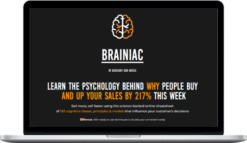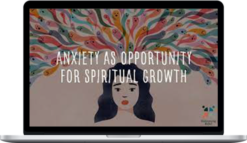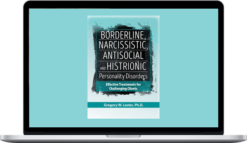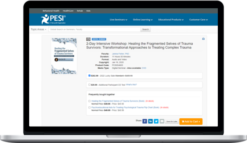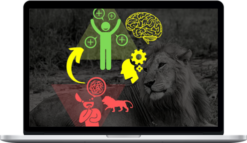Aaron Testard – LGBTQ Clients in Today’s World: Treatment Strategies for Gender & Sexual Identity Issues
$222.00 $42.00
»Instant Delivery
Description
Aaron Testard – LGBTQ Clients in Today’s World: Treatment Strategies for Gender & Sexual Identity Issues
Description of LGBTQ Clients in Today’s World: Treatment Strategies for Gender & Sexual Identity Issues
From the deeply personal and intricate journeys clients take to find themselves to the variety of terms and ideas in today’s LGBTQ cultures, it’s easy to feel lost in the complexity of sexual and gender identity. But with the proper tools and knowledge, you can have confidence to walk solidly side by side with your LGBTQ clients.
This recording provides clear strategies to comfortably engage clients around cultural norms, gender, sex, relationships, and terminology. In addition to building trust and credibility with your LGBTQ clients, you will learn the navigation map that will help you appropriately tailor your treatment approaches each step of the way in the client’s self-discovery process.
Aaron Testard combines time-tested research with the latest findings and up-to-date movements in the field for a comprehensive approach for working with any LGBTQ client in any phase and on any part of the sexuality-gender spectrums.
What You Will Learn in LGBTQ Clients in Today’s World: Treatment Strategies for Gender & Sexual Identity Issues
Objectives
- Appraise current trends and perspectives in the LGBTQ+ community and the implications for clinical work.
- Build safety and trust effectively with LGBTQ clients in clinical practice.
- Analyze the main factors impacting treatment and the identity development process of LGBTQ+ clients.
- Differentiate the phases of identity development for LGBTQ+ clients to better inform treatment planning.
- Integrate LGBTQ+ history and knowledge into the clinical session.
- Apply treatment strategies to help clients in each phase of LGBTQ+ identity development.
Outline
- Current Trends in LGBTQ Clinical Work
- Increased family and community acceptance: What this means for our work
- Sexuality and gender: separate but connected
- Polyamory and open relationships
- Conversion therapy debunked
- Online dating and hook-up culture
- Establish Safety with LGBTQ Clients
- Terminology to include in website, business profiles, and client registration forms
- Avoid the most common mistakes by therapists that break safety and trust
- Build rapport quickly and effectively
- Talk about sex with openness and comfort
- Incorporate gender talk and knowledge into your vocabulary
- The Factors That Impact LGBTQ Mental Health Treatment
- How being LGBTQ is connected to depression, anxiety, and addiction … and how it is not
- How developmental trauma affects identity development
- Particular traumas:
- Bullying
- Bashing
- Institutional Oppression
- Conversion Treatment History
- Family mirroring and acceptance
- Religious and cultural barriers
- Sexual health and wellness
- Alcohol and substance use
- Help Clients at Each Phase of LGBTQ Identify Development
- Phase 1: Pre-Coming Out
- Denial about sexual orientation or gender
- When sexual behavior doesn’t match sexual identity
- Differentiate between feelings, behavior, and identity
- The importance of continued sexual health assessment and education
- Phase 2: Comparison and Consideration
- When clients start to think they might be LGBTQ (or at least different)
- Client cues that are openings to explore further
- Questions to elicit more open discussion
- How to inquire without pushing beyond client readiness
- Phase 3: Tolerance and Exploration
- When clients are exploring sexuality and gender but have not claimed an identity
- Use different models of sexuality and gender with clients
- Track for integration: Is this helpful for the client?
- Address shame and internalized homophobia/transphobia
- Identify educational resources
- Phase 4: Acceptance
- When clients start to integrate their sexual and gender identity into the world
- Connect clients with community support
- Facilitate grief for lost time and lost dreams
- Develop a coming-out plan and process
- Start talking about gender transition
- Tools to navigate the conflicting worlds of family, identity, and cultures
- Phase 5: Pride
- Address client rage about oppression and past injuries (even when it’s directed toward you)
- Support clients in celebrating their “adolescence”: validation and safety
- Attend to the particular challenges of bisexuals
- Phase 6: Synthesis and Integration
- When being LGBTQ is hardly an issue for the client
- Effectively integrate LGBTQ history and knowledge into the clinical session
- Phase 1: Pre-Coming Out
About Aaron Testard

Aaron Testard, LMFT, LPCCRelated seminars and products
Aaron Testard, LMFT, LPCC, is a psychotherapist in private practice in Berkeley, California with over 20 years of experience. For 7 years, he served as Director of Clinical Programs at the Pacific Center for Human Growth, an LGBTQ counseling and support center where he designed an implemented psychotherapy serves for individuals, couples, and families, 24 adult peer support groups, and an after-school youth program.
He also has trained and supervised numerous interns over the years and has been an LGBTQ community mental health consultant for local clinics and organizations. Aaron has spent the majority of his career as an LGBTQ specialist. Including time as an addiction counselor, a high school counselor, and a consultant for a felon re-entry program. In his current practice, he focuses on sexual and gender identity. He works with adults, adolescents, and couples and consults with clinicians throughout the United States.
Aaron received his MA in Counseling Psychology from the California Institute of Integral Studies. He is a trained drama therapist, sensorimotor therapist, and practitioner of the Gottman couple’s method, EMDR, and DBT-informed client work.
Speaker Disclosures:
Financial: Aaron Testard maintains a private practice. He receives a speaking honorarium from PESI, Inc. Aaron has no relevant financial relationships with ineligible organizations.
Non-financial: Aaron Testard is a member of the American Association for Marriage and Family Therapy; Gaylesta; World Professional Association of Transgender Health (WPATH); and Bay Area Open Minds.
Who is LGBTQ Clients in Today’s World: Treatment Strategies for Gender & Sexual Identity Issues For:
- Counselors
- Social Workers
- Psychologists
- Psychotherapists
- Case Managers
- Marriage & Family Therapists
- Addiction Counselors
- Educators
- Nurses
- Other Mental Health Professionals
More courses from the same author: Aaron Testard
Delivery Policy
When will I receive my course?
You will receive a link to download your course immediately or within 1 to 21 days. It depends on the product you buy, so please read the short description of the product carefully before making a purchase.
How is my course delivered?
We share courses through Google Drive, so once your order is complete, you'll receive an invitation to view the course in your email.
To avoid any delay in delivery, please provide a Google mail and enter your email address correctly in the Checkout Page.
In case you submit a wrong email address, please contact us to resend the course to the correct email.
How do I check status of my order?
Please log in to HealingCourse account then go to Order Page. You will find all your orders includes number, date, status and total price.
If the status is Processing: Your course is being uploaded. Please be patient and wait for us to complete your order. If your order has multiple courses and one of them has not been updated with the download link, the status of the order is also Processing.
If the status is Completed: Your course is ready for immediate download. Click "VIEW" to view details and download the course.
Where can I find my course?
Once your order is complete, a link to download the course will automatically be sent to your email.
You can also get the download link by logging into your HealingCourse account then going to Downloads Page.
Related products
Total sold: 2
Total sold: 1
Total sold: 3
Total sold: 4
Total sold: 2



